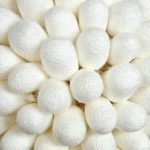Looking for a gentle, skin-friendly fabric? Look no further than organic silk. It’s perfect for those with sensitive skin, offering a host of benefits that you’ll love.
In this guide, we’ll show you how to choose the right organic silk products, provide care tips for your sensitive skin, and even give you some styling ideas for your organic silk clothing.
Plus, we’ll explore the environmental impact of organic silk and tell you where to find high-quality products.
Table of Contents
What Is Organic Silk
Organic silk, made from silkworms fed on organic mulberry leaves, is a luxurious and sustainable fabric option for those with sensitive skin. The sustainability of organic silk lies in its production process, which involves using organic methods to cultivate the mulberry trees and rear the silkworms. Unlike conventionally produced silk, organic silk doesn’t rely on harmful pesticides or synthetic fertilizers, making it environmentally friendly.
The organic silk production process starts with growing mulberry trees without the use of chemicals. These trees provide the sole food source for the silkworms. By ensuring that the leaves are free from pesticides, the quality of the silk is enhanced. Organic farmers also prioritize the health and well-being of the silkworms by allowing them to feed on these organic leaves.
Once the silkworms have consumed the organic mulberry leaves, they spin their cocoons, which consist of fine silk threads. Harvesters carefully collect these cocoons and then use a process called reeling to extract the silk threads. This process involves unraveling the cocoons and spinning the silk threads onto reels.
The Benefits of Organic Silk for Sensitive Skin
Discover the numerous benefits of organic silk for your sensitive skin.
Silk is naturally hypoallergenic, making it an excellent choice for those with sensitive skin or allergies.
Its breathability allows for better air circulation, reducing the risk of irritation and promoting skin health.
Additionally, silk’s natural moisture-wicking abilities help keep your skin dry and comfortable throughout the day.
Hypoallergenic Properties of Silk
Silk’s hypoallergenic nature makes it an ideal choice for those with sensitive skin. When it comes to the benefits of organic silk for sensitive skin, here are three key points to consider:
-
Hypoallergenic benefits: Silk is naturally hypoallergenic, meaning it’s less likely to cause allergic reactions or irritation. This is because silk fibers are smooth and don’t contain any rough or abrasive textures that can irritate sensitive skin.
-
Silk alternatives for allergies: Many people with sensitive skin often struggle to find fabrics that don’t trigger allergic reactions. Organic silk provides an excellent alternative to other materials like cotton or synthetic fabrics, which can sometimes cause skin irritation.
-
Breathability and moisture-wicking: Silk has the ability to regulate temperature and wick away moisture from the skin, keeping it dry and comfortable. This is especially beneficial for individuals with sensitive skin, as excessive moisture can lead to irritation and rashes.
Breathability for Sensitive Skin
Enjoy the exceptional breathability of organic silk, providing optimal comfort for your sensitive skin. Unlike other synthetic fabrics, organic silk allows air to circulate freely, reducing the risk of irritation and discomfort. This natural fiber has the unique ability to regulate temperature, keeping you cool in hot weather and warm in cold weather. The breathability of organic silk helps to prevent the accumulation of moisture, which can lead to bacterial growth and unpleasant odors. For those with sensitive skin, finding suitable alternatives to silk can be a challenge. However, organic silk offers a gentle and breathable option that promotes comfort and well-being. Take a look at the table below to compare the breathability and comfort of organic silk with other silk alternatives for sensitive skin.
| Fabric | Breathability | Comfort |
|---|---|---|
| Organic Silk | High | Excellent |
| Cotton | Moderate | Good |
| Linen | High | Very Good |
| Bamboo | High | Very Good |
Choose organic silk for its unparalleled breathability and comfort, and experience the difference it can make for your sensitive skin.
Natural Moisture-Wicking Abilities
Organic silk’s natural moisture-wicking abilities offer numerous benefits for sensitive skin. Here are three reasons why:
-
Moisture Wicking Benefits: Organic silk has the remarkable ability to draw moisture away from your skin, keeping you dry and comfortable throughout the day. Unlike synthetic materials, which can trap sweat and cause irritation, organic silk helps to regulate your body temperature by efficiently absorbing and releasing moisture.
-
Comfort: If you have sensitive skin, you know how important it’s to find clothing that feels soft and gentle against your skin. Organic silk’s smooth and silky texture provides exceptional comfort, making it an ideal choice for those with sensitive skin. It glides effortlessly over your skin, reducing friction and minimizing the risk of irritation.
-
Durability: Despite its delicate appearance, organic silk is surprisingly durable. It can withstand repeated washing without losing its moisture-wicking properties or compromising its comfort. This means that you can enjoy the benefits of organic silk for a long time, making it a worthwhile investment for your sensitive skin.
How to Choose the Right Organic Silk Products
When choosing organic silk products for your sensitive skin, it’s important to consider the different types of silk available and their benefits.
Look for silk options specifically designed for sensitivities, such as hypoallergenic or mulberry silk, which are known for their gentle and non-irritating properties.
Understanding the benefits of organic silk, such as its breathability and moisture-wicking abilities, can also help you make the right choice for your skin.
Silk Types for Sensitivities
To choose the right organic silk products for sensitive skin, consider the different types of silk available. Here are three key types to keep in mind:
-
Mulberry Silk: This is the most common type of silk fabric and is produced by silkworms that feed exclusively on mulberry leaves. It’s known for its smooth texture and durability, making it a great option for those with sensitive skin.
-
Tussah Silk: Also known as wild silk, Tussah silk is produced by silkworms that feed on a variety of leaves, resulting in a coarser texture compared to Mulberry silk. However, it still offers great breathability and hypoallergenic properties, making it suitable for sensitive skin.
-
Eri Silk: Eri silk is produced by silkworms that feed on castor leaves, making it a sustainable and eco-friendly option. It has a slightly rougher texture than Mulberry silk but is still gentle on sensitive skin, making it an ideal choice for those looking for organic silk products.
Benefits of Organic Silk
Consider the numerous benefits and factors to help you choose the perfect organic silk products for your sensitive skin.
Organic silk production is a more sustainable and environmentally-friendly alternative to conventional silk production. Organic silk is made from silk worms that are raised without the use of harmful chemicals, pesticides, or synthetic fertilizers. This ensures that the silk is free from potential irritants that can cause skin allergies or sensitivities.
Additionally, organic silk is naturally hypoallergenic and breathable, allowing your skin to breathe and preventing sweat and moisture buildup. When choosing organic silk products, look for certifications such as GOTS (Global Organic Textile Standard) to ensure the product meets strict organic standards.
Organic Silk Care Tips for Sensitive Skin
You can easily care for organic silk if you have sensitive skin. Here are three essential tips to follow in order to maintain the quality and comfort of your organic silk garments:
-
Handwashing: To ensure the longevity of your organic silk clothing, it’s best to handwash them using a mild detergent specifically formulated for delicate fabrics. Fill a basin with lukewarm water and add the detergent. Gently agitate the garment in the water, making sure to avoid any harsh rubbing or wringing. Rinse thoroughly and lay flat to dry. Avoid using bleach or fabric softeners as they can damage the fibers.
-
Storage: Proper storage is crucial to prevent any damage to your organic silk garments. It’s recommended to fold them neatly and store them in a cool, dry place away from direct sunlight. Avoid hanging silk clothing as it can stretch the fibers.
-
Silk alternatives for sensitive skin: If you find that your sensitive skin reacts to organic silk, there are alternative fabrics available that provide similar benefits. Look for clothing made from organic cotton or bamboo, as they’re hypoallergenic and gentle on the skin.
Styling Ideas for Organic Silk Clothing
If you have sensitive skin and are looking to style your organic silk clothing, there are several options to consider. Styling tips for organic silk clothing can help you create different looks while keeping your sensitive skin comfortable.
One way to style your organic silk clothing is by pairing it with other silk accessories. Silk scarves, for example, can add a touch of elegance to any outfit. You can tie a silk scarf around your neck or use it as a headband to create a chic look.
Another option is to accessorize your organic silk clothing with silk belts. A silk belt can cinch in your waist and add definition to your outfit. Additionally, you can opt for silk handbags or clutches to complement your organic silk clothing. These accessories not only add a luxurious touch but also ensure that your sensitive skin is in contact with only the softest and most gentle materials.
Remember to choose accessories that match the color and style of your organic silk clothing to create a cohesive and fashionable look. By following these styling tips and incorporating silk accessories, you can create stylish outfits that showcase your organic silk clothing while keeping your sensitive skin happy.
The Environmental Impact of Organic Silk
To understand the environmental impact of organic silk, let’s delve into its production process. Here are three key points to consider:
-
Sustainable farming practices in organic silk production: Organic silk is derived from silkworms that are raised on organic mulberry trees. These trees are cultivated without the use of synthetic pesticides, herbicides, or fertilizers. By practicing sustainable farming methods, organic silk production promotes biodiversity, reduces soil erosion, and minimizes the contamination of nearby water sources.
-
Comparison of environmental impact between organic silk and conventional silk production: Conventional silk production often involves the use of chemical pesticides and fertilizers, which can have detrimental effects on the environment. These chemicals can pollute the soil, water, and air, causing harm to ecosystems and wildlife. In contrast, organic silk production prioritizes natural and eco-friendly methods, resulting in a lower overall environmental impact.
-
Preservation of natural resources: By opting for organic silk, you contribute to the conservation of natural resources. Organic silk production relies on sustainable practices that minimize water usage, energy consumption, and waste generation. This helps to reduce the strain on ecosystems and promotes long-term environmental sustainability.
Where to Buy High-Quality Organic Silk Products
Once you have decided to embrace organic silk for its environmental benefits, finding high-quality products is a key next step. When it comes to sustainable fashion and ethical silk production, it’s important to choose brands that prioritize these values.
Luckily, there are several options available for purchasing high-quality organic silk products.
One option is to look for reputable online retailers that specialize in organic silk. These retailers often work directly with ethical silk producers and have a wide range of organic silk products available, including clothing, bedding, and accessories. By purchasing from these retailers, you can be confident that you’re supporting sustainable fashion and ethical silk production.
Another option is to seek out local boutiques or stores that carry organic silk products. These smaller, independent businesses may have a curated selection of high-quality organic silk items. By shopping locally, you can also reduce your carbon footprint and support your community.
Lastly, attending eco-friendly and sustainable fashion events can be a great way to discover new brands and designers who prioritize ethical silk production. These events often feature a variety of organic silk products, allowing you to see and feel the quality firsthand.
Frequently Asked Questions
Is Organic Silk Suitable for People With Allergies?
Organic silk is suitable for people with allergies due to its hypoallergenic properties. It is gentle on sensitive skin, providing relief from irritation. Compared to other fabrics, organic silk offers numerous benefits for those with sensitive skin.
Can Organic Silk Be Dyed With Natural Dyes?
Yes, organic silk can be dyed with natural dyes. Organic silk dyeing techniques allow for beautiful and vibrant colors. Using natural dyes on organic silk has the added benefit of being gentle on sensitive skin.
Are There Any Specific Washing Instructions for Organic Silk?
To properly care for your organic silk, follow these washing tips: use a gentle detergent, hand wash or use a delicate cycle, in cold water, and air dry. Using organic silk benefits your sensitive skin by reducing irritation and providing breathability.
Is Organic Silk More Expensive Than Conventional Silk?
Organic silk is typically more expensive than conventional silk due to its production process and the benefits it offers. However, it is worth the investment for those with sensitive skin who want a gentle and sustainable fabric.
Can Organic Silk Be Used for Bedding and Home Decor Items?
Yes, organic silk can be a great alternative to synthetic fabrics for bedding and home decor items. It offers numerous benefits such as being hypoallergenic, breathable, and sustainable.
- A Guide to Washing Polyester Suede Fabric - July 12, 2025
- Where to Buy Suede Fabric in Singapore - July 12, 2025
- How to Remove Stains From Faux Suede Fabric - July 12, 2025






